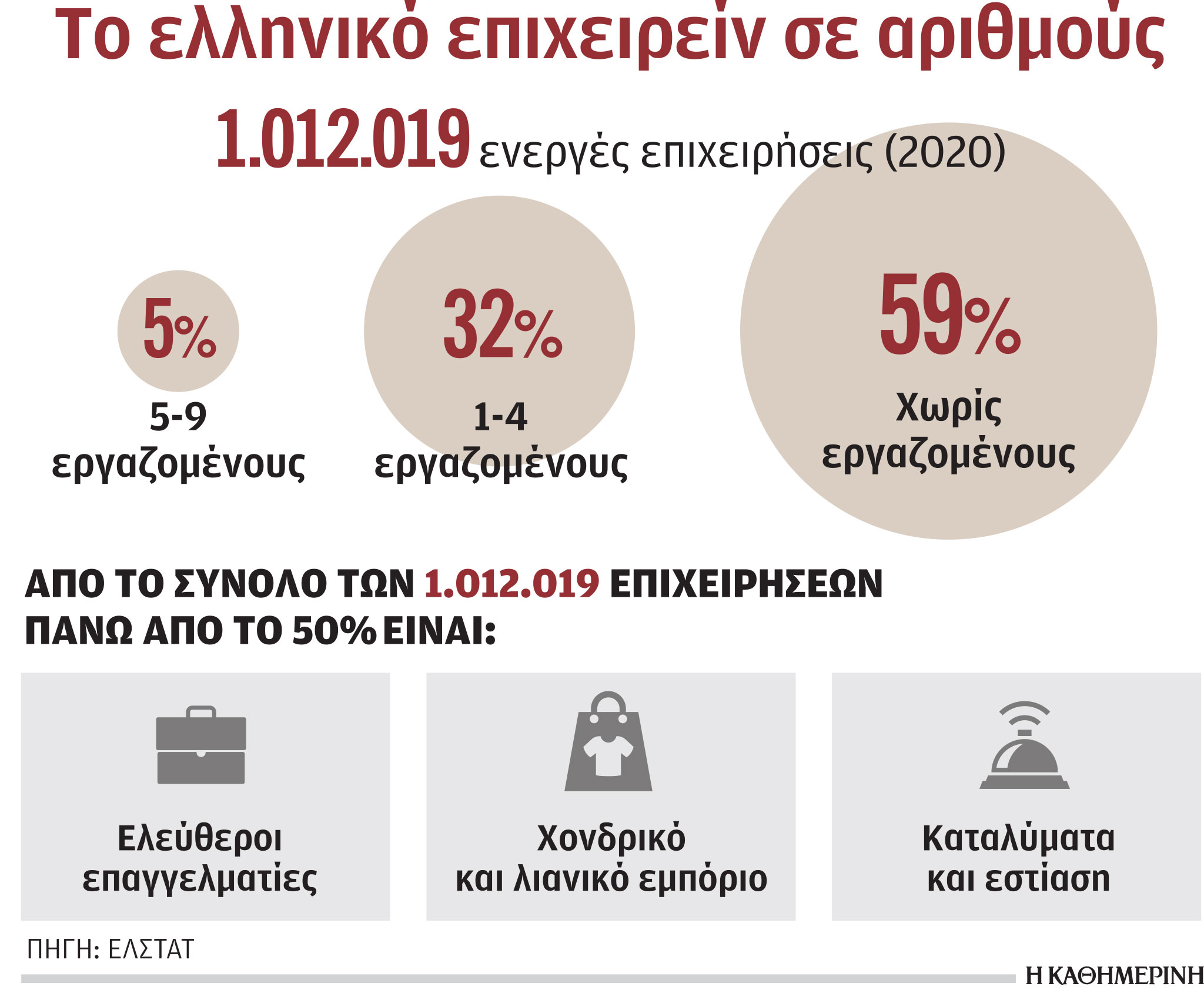
Too, too small enterpriseshalf of which employ no workers other than their owners, are the core of the household. small and medium business, with most of them operating in sectors with low value added and low productivity. Merchants, catering entrepreneurs, and freelancers occupy a large part of the domestic business map over time, and they are a type of entrepreneurship that usually has a limited degree of extraversion and is quite vulnerable to “crises”.
As shown by preliminary data released yesterday ELSTATabout the demographics of businesses in Hellas, in 2020, the year the coronavirus pandemic began, the number of active enterprises exceeded 1 million and reached 1,012,019 from 984,001 in 2019. Of these, almost 6 out of 10 enterprises, i.e. 595 378 have no employees. In other words, these are separate enterprises that are “managed” by the owners themselves. A smaller number of enterprises, i.e. approximately 321,156, have 1-4 workers, and even fewer, i.e., 49,340 enterprises with 5-9 workers. The above figures show that out of all operating enterprises, 95% or 965,874 employ between 0 and 9 workers, i.e. very small enterprises. These figures once again highlight some of the “wounds” of Greek entrepreneurship, wounds that are not the result of crises, but are eternal. For many years, Greece has had a large number of very small enterprises with low productivity, with a rather limited degree of extraversion, and lagging behind – compared to other European countries – in technology and innovation. Companies of this size usually find it difficult to make large productive investments, especially in times of crisis, and they operate in industries with low value added, which does not allow them to be competitive.
According to ELSTAT, out of the total number of active enterprises (1 million), 54% are engaged in wholesale and retail trade, accommodation and catering services, as well as professional and technical activities. In particular, 259,186 enterprises belong to the wholesale and retail trade, 159,602 enterprises carry out professional activities and 126,025 enterprises provide accommodation and catering services. It also follows from the ELSTAT data that the measures taken by the state for businesses during the pandemic, to a certain extent, supported both those who were affected and those who could potentially be blocked. Thus, in 2020, the number of castles reached 22,456, which is 23.2% less compared to 2019, when their number reached 29,238, and the number of active enterprises increased by 2.8% to 1,012,019 from 984,001. Also there was a slight decrease in the number of recommendations (0.7%) in 2020, which amounted to 47,103 enterprises from 47,418. Of course, the impact of the pandemic on high-growth enterprises was noticeable: their number decreased from 7,300 in 2019 to 4,773 in 2020, that is, by 34.6%. The largest decline affected companies operating in the field of accommodation and catering (53.5%), as well as companies engaged in administrative activities (47.7%).
Transnational corporations
Although the number of subsidiaries of foreign companies operating in Greece is considerably small considering all the companies operating in the country, their contribution to the Greek economy seems to be decisive. According to ELSTAT, in 2020 these companies accounted for only 0.5% of all businesses, and their turnover in the same year reached 46.1 billion euros, representing 19.4% of the total turnover. In 2020, there were a total of 3691 such enterprises, which in the same year employed almost 8% of the total number of employees with activities in Greece. The value of production and gross value added of individual enterprises amounted to 27.9 billion and 10.7 billion euros, respectively, representing 19.6% of the total value of production and 22.8% of the total gross value added. In 2020, they made a gross investment in tangible goods of 1.48 billion euros, corresponding to 20.5% of the total investment, while they spent 6 billion euros on staff salaries, corresponding to 20.6% of total labor costs. from enterprises. The presence of companies based in Cyprus, in the UK, the Netherlands, Luxembourg, Germany, etc., is greater in Greece. In particular, foreign affiliated companies, whose ultimate institutional controlling unit was in Cyprus, account for 44.5% of all foreign affiliated companies, and their turnover reaches 6.7 billion euros. Of course, some of them may represent the interests of Greece, which decided to settle in Cyprus for tax reasons.
Source: Kathimerini
Lori Barajas is an accomplished journalist, known for her insightful and thought-provoking writing on economy. She currently works as a writer at 247 news reel. With a passion for understanding the economy, Lori’s writing delves deep into the financial issues that matter most, providing readers with a unique perspective on current events.